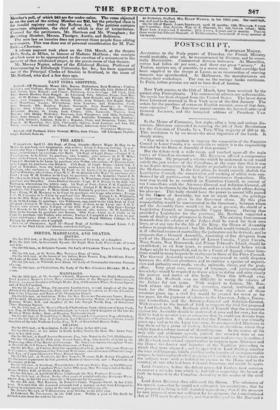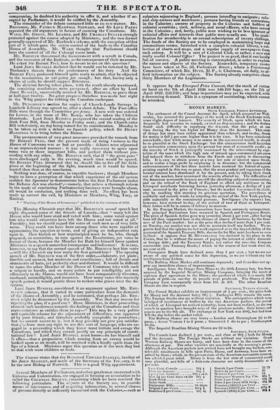In the House of Commons, last night, after a long
and serious dis- cussion, Ministers sueceeded in carrying the 5th of their Resolutions for the Coercion of Canada, by a Tory-Whig majority of 269 to 46. This resolution is by no means the most important of the batch. It simply states,
" That while it is expedient to improve the composition of the Executive Council in Lower Canada, it is unadvisible to subject it to time revonsibil4 demanded by the House of Asr.etubly of that province."
But the debate took a wide range, and touched upon all the main tupies of Canadian discontent. Mr. Roenccs offered a compromise to Nlinisters. He proposed a scheme which he undertook to say would satisfy the just wishes of the Canadians, at the same time that it was in no degree derogatory to the dignity or prejudicial to the interests of tile Mother-country. In the first place, be would entirely abolish the Legislative Council, the constitution and working of which were con- demned by all pat-ties—even by the Comtnissioncrs themselves. His next step would be to establish an Executive Council, to consist of ten Councillors, with the Attorney-General and Solicitor-General, all of them to be chosen by the Governor, and to retain their offices during his pleasure. This body should have the power to amend hills passed by the House of Assembly, but not to reject them ; the privilege of rejection being given to the Governor alone. By this plan responsibility would be concentrated in the Governor ; between whom and the Assembly there would not be, as at present, the shield of a Legislative Council, or irresponsible Upper House. Having thus provided a Legislature for the province, Mr. Roebuck suggested & mode of dealing with grievances in detail. The existing Government demands that the salaries of the Judges shall be voted for their own lives, or at any rate for the life of the King: the House of Assembly refuses to grant this demand : but Mr. Roebuck would virtually concede it, if effectual means of controlling the judicature can be devised ; and he proposes that a General Assembly, consisting of five delegates from each of the Houses of Assembly of Lower Canada, Upper Canada, Nova Scotia, New Brunswick, and Prince Edwald's Island, should be established ; to sit four years, to constitute a tribunal before which Judges might be impeached, and to be a Court of Appeal, whose func- tions would in many respects be analogous to those of the Privy CounciL The General Assembly would Aso be empowered to settle disputes between the different provinces, and to exercise a species 'of supervi- sion and authority over roads, canals, railroads, rivers, and the post- office. Very great car:, mastery of language, and jurisprudential knowledge would be required to frame a law to define and state clearly the powers and duties of this body. Were this tribunal esta- blished, Mr. Roebuck sees no difficulty in voting the salaries of the Judges for ten years. With respect to finance, Mr. Roe- buck claims the whole of the revenues, casual, territorial, and land, for the House of Assembly. Were the whole of these revenues given up, a civil list would be granted for seven or for ten years, for the payment of salaries to the Governor, Judges, Execu- tive Councillors, and the Attorney- General and Solicitor- General. With respect to the breach of faith as respects the civil list proposed by Lord Goderich, Mr. Roebuck pleffi7:11 himself that the aecusatioo against the Assembly should be miswered at once and for over ; but the field be bad to go over was so extett-i ve that be could nut deviate from the direct path then. He observed that the Tenures Act was virtually given up ; aud as to the Land Cooloany, he reconninended Ministers to buy them off ioy a grant of land itt Austrolia or elsewhere. where they might found a colony instead of disturbing one. In the course of his very able and elaborate speech, (which the crowded state of our columns mskes it impossiblo to present to our readers : VeZI in ontline,) Mr. Roebuck took sevet ttl opportomities to impress upon Ministers and the House the danger and iiijustice of the liAgitious proveeding in Which they were ettgaged ; and he appealed to Lord Stanley, whether the tone mid language, wlikb, yielding or the impulse ef au ungovernable temper, he hail employed when ,p;.akitig t in the he.t debate OR the so bieet, were sad, as befitted iii. station in the lioni:e and in the countiy, or one who had been Colunial Seer entry. told might be again.
Lord STANLEY, before the debate proceeded further, took occasion to correct a misteke into which he had Whin resperting the breach of Nth he imputed to the Canadiau A ssenddy in the matter of the civil list.
Lord Jul's: Russets, then addressed the House. The substance of his speech o as—that be would not relinquish his resolutions ; that he was prepared to briug in bills founded upon them ; that if tile measure he now proposed were not sailicieut for his purpose, tire Constitutional Act of 1711 must be abro,.;eted ; nod that with r •gard to Mr. Roe:nick's Compromise, he doubted II is authority to offer it, and whether if ac- cepted by Parbanana, it would be ratified by the Assembly. The remainder of the debate contained little or no new matter. Mr. ROBINSON, Mr. PATRICK MAXWELL STEWART, and Sir LOVE PARRY repeated the old arguments in favour of coercing the Canadians. Mr. WARD, Mr. GROTE, Mr. LEADER, and Mr. CHARLES BOILER strongly protested against the course adopted by Ministers; and the two former generally approved of Mr. Roebuck's scheme, with the exception of that part of it which gave the entire control of the lands to the Canadian House of Assembly. Mr. WARD thought that Parliament should have the control of all the Colonial waste lands.
Mr. ROEBUCK threatened the Government with a revolt in Canada, and the secession of the Radicals, as the consequence of their measures. He asked Sir Robert Peel, how he meant to act on this question ?
Lord JOHN RUSSELL declared that be would mat be deterred by Mr. Roebuck's threats from the performance of his duty And Sir ROBERT PEEL professed himself quite ready to admit, that he objected to the resolutions, as uot going far eneuyli ; but that, having only a choice of evils, be should support l‘linisters. The division having taken place, with the result already mentioned, the remaining resolutions were postponed, after an effort by Lord JOHN RUSSELL, successfully resistt d by Mr. Rotnucx, to press them at half-past twelve. No great progress therefore was made last night in the Whig project for robbing the Canadian exchequer.
Mr. Duiscomee's motion for copies of Church-Lands Surveys in Lambeth Library was agreed to, after a short debate. The Post-office Bills went through the Committee proforma. A new writ was ordered for Lewes, in the room of Mr. Kemp, who has taken the Chiltern Hundreds. Lord JOHN RUSSELL pcstponed the second reading of the Irish Poor Bill, from Monday to f'riday next ; and the Church-rates Bill indefinitely, no day being named for its consideration. Monday is to be taken up with a debate on Spanish policy, which Sir HENRY HARDINGE i6 to bring before the House.
.The postponement of two great measures provoked the remark from Sir ROBERT PEEL, that the present mode of doing I usiness in the House of Commons was as bad as possible : debates were adjourned in an unprecedented manner : it was really necessary to agree upon some two or three important bills, and perfect them without pro- ceeding with any other. Mr. Roeuucx said, that if " the great guns" were discharged early in the evening, much time would be spared. Sir ROBERT PEEL intimated that be should like to fire off his field- piece at the beginning of the fight, inasmuch as it would be better loaded then than at the conclusion.
Nothing was done, of course, to expedite business; though Members begin to have a perception of that which experience of the old system enabled the Spectator to demonstrate before the first Parliament under the Reform Act was elected',—namely, that unless a thorough reform in the mode of conducting Parliamentary business were brought about, all would he confusion, and nothing done well. No effort has been made to correct the evil, by Ministers or Members, Whig, Tory, or Radical.
• " Winking of the House of Commons e, published in the autumn of 1932.



























 Previous page
Previous page